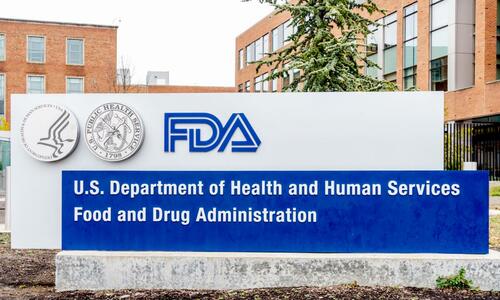Authored by Jack Phillips via The Epoch Times (emphasis ours),
Green organic kiwifruit is now under recall in 14 states due to a potentially deadly listeria contamination, according to an announcement posted on the U.S. Food and Drug Administration (FDA) website.
David Oppenheimer and Company said it is voluntarily recalling some of its clamshell packages of kiwi after testing found Listeria monocytogenes in some of the products, according to the notice. The bacteria can cause listeriosis, a sometimes severe and fatal infection.
The company traced the contamination back to two grower lots in New Zealand. The recalled kiwi, repackaged locally for sale in 1-pound clear plastic clamshells has the Zespri brand and UPC code 8 18849 02009 3, and it has fruit with a sticker featuring a GTIN bar code of 9400 9552.
The recalled products were shipped between June 14, 2023, and July 7, 2023, and were sold in Florida, Georgia, Illinois, Indiana, Kentucky, Minnesota, North Carolina, New York, Ohio, Pennsylvania, Tennessee, Texas, Virginia, and Wisconsin.
No illnesses have been reported to date in connection to the products, according to the notice. No other products from David Oppenheimer and Company are subject to the recall.
What Is Listeria?
Federal health officials say that listeria is a bacteria that can cause severe or fatal illness in children, the elderly, or individuals with compromised immune systems. Healthy people can suffer short-term problems including a high fever, nausea, stiffness, diarrhea, abdominal pain, and headaches. Among pregnant women, the organism can cause stillbirths and miscarriages.
Individuals who are infected with the bacteria may see symptoms within a few hours to three days after eating contaminated food, according to the FDA’s website. More severe forms can take three days to three months to develop.
“L. monocytogenes is generally transmitted when food is harvested, processed, prepared, packed, transported or stored in environments contaminated with L. monocytogenes. Environments can be contaminated by raw materials, water, soil, and incoming air. Pets can also spread the bacteria in the home environment if they eat food contaminated with L. monocytogenes,” says the FDA’s website.
Despite the warnings, the bacteria appears to be rare. An estimated 1,600 Americans develop listeriosis each year, while about 260 die, according to the Center for Disease Control and Prevention’s (CDC) data.
“Listeria bacteria can survive refrigeration and even freezing. So people who are at higher risk of serious infections should avoid eating the types of food most likely to contain listeria bacteria,” according to the Mayo Clinic’s website. That includes “improperly processed” deli meat products and unpasteurized milk products, it says, while also listing raw vegetables that have been contaminated from manure or soil as a source of infection.
Read more here…



